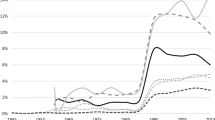Abstract
Biological scientists, like scientists in other disciplines, are uncertain about whether or how to use their knowledge and time to provide society with insight and guidance in handling the effects of inventions and discoveries. This article addresses this issue. It presents a typography of structures in which scientists may contribute to social understanding and decisions. It describes the different ways in which these contributions can be made. Finally it develops the ethical arguments that justify the view that biological scientists have social responsibilities.
Similar content being viewed by others
References
Brown, G. E.Jr. (1993) The Mother of Necessity: Technology Policy and Social Equity. Presentation given at the American Association for the Advancement of Science (AAAS) Science and Technology Policy Colloquium, Washington, DC, April 16.
Dismukes, K. (1979) What should society expect from scientists? Bulletin of the Atomic Scientists 35 (9): 19–21.
Pigman, W. & Carmichael, E. B. (1950) An Ethical Code for Scientists. Science 111: 643–647.
Bethe, H. (1983) The Ethical Responsibilities of Scientists. Weapons Development Rather than Military Research Poses the Most Difficult Questions, The Center Magazine 16 (5): 2–5.
Bevan, W. (1977) Science in the Penultimate Age, American Scientist 65 (5): 538–546.
Atkinson, R. C. (1978) Rights and Responsibilities in Scientific Research, The Bulletin of the Atomic Scientists 34 (10): 8–14.
Bulger, R. E. (1994) Toward a Statement of the Principles Underlying Responsible Conduct in Biomedical Research, Academic Medicine 69 (2): 102–107.
Watson, J. D. (1990) The Human Genome Project: Past, Present, and Future, Science 248 (4951): 44–49.
Shrader-Frechette, K. (1994) Ethics of Scientific Research, Rowman & Littlefield Publishers, Inc., Boston, Massachusetts.
Hippocratic Oath. (1977) In: Reiser, S. J., Dyck, A. J. & Curran, W. J., eds., Ethics in Medicine: Historical Perspectives and Contemporary Concerns, Massachusetts Institute of Technology Press, Cambridge, Massachusetts.
Reiser, S. J. (1994) The Ethics of Learning and Teaching Medicine, Academic Medicine 69: 872–876.
Geller, L. N., Alper, J. S., Billings, P. R., Barash, C. I., Beckwith, J. & Natowicz, M. R. (1996) Individual, Family, and Societal Dimensions of Genetic Discrimination: A Case Study Analysis. Science and Engineering Ethics 2: 71–88.
The Nuremberg Code, reprinted from Trials of War Criminals before the Nuremberg Military Tribunal under Control Council Law, (1949) #10, Volume 2, Government Printing Office, Washington, D C.
DHHS (Department of Health and Human Services) (1995) Guide for the Care and Use of Laboratory Animals (revised). NIH Publication #86-23. DHHS, Washington, DC.
Berg, P., Baltimore, D., Brenner, S., Roblin, R. O.III & Singer, M. F. (1975) Summary statement of the Asilomar Conference on recombinant DNA molecules, Science 188: 991.
Fredrickson, D. S. (1991) Asilomar and recombinant DNA: The end of the beginning. In: Hanna, K. E., ed., Biomedical Politics, Institute of Medicine, National Academy Press, Washington, D.C.
National Institutes of Health, Guide to Grants and Contracts, (1989) Vol. 18, No. 45, December 22.
Author information
Authors and Affiliations
Additional information
The opinions expressed here are those of the authors and do not necessarily represent those of the Department of Defense.
Rights and permissions
About this article
Cite this article
Reiser, S.J., Bulger, R.E. The social responsibilities of biological scientists. SCI ENG ETHICS 3, 137–143 (1997). https://doi.org/10.1007/s11948-997-0004-8
Received:
Accepted:
Issue Date:
DOI: https://doi.org/10.1007/s11948-997-0004-8




